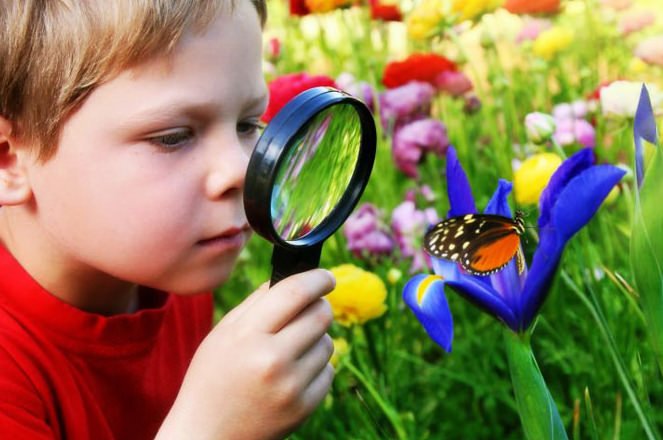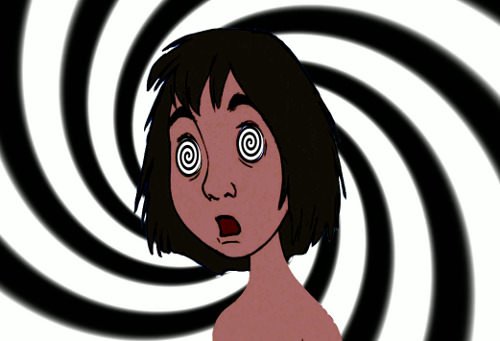
We humans come into this world with a collection of physical senses, and a downright miraculous “figuring-stuff-out” engine: the human brain. From the beginning, our little baby brains are collecting sensations and experiences constantly, and extrapolating all sorts of stuff at an amazing rate. We all start as unbiased, honest, efficient scientists.
That’s not to say we do it perfectly. We often figure out stuff that isn’t actually true, and have to adjust our understanding later. Specifically, we tend to decide what the whole universe is like based on whatever our own limited personal experiences happened to be. For example, a child that has been growled at or snapped at by a dog or two may involuntarily decide, “All dogs are mean and scary!” Usually the cure for jumping to false conclusions is simply acquiring more information. Live your life, observe things, pay attention to stuff, wonder about stuff, figure stuff out—rinse and repeat.

Isn’t it great to be living in a world full of such amazing self-teaching beings, who start out equipped and eager to investigate, discover and figure out the world around them, mostly using their own built-in senses (thus the saying, “I’ll believe it when I see it!”)? But there’s a problem. Because today, much of what people “experience” … they didn’t actually experience. Instead of gathering information and evidence by observing the world around them, they mostly gather misinformation, false evidence and propaganda, by way of observing computer monitors and TV screens, and listening to radio broadcasts and “news reports.” And yet their brains often log and store such things as if they were actual experiences.
Of course, things like the internet can also be massively helpful in the quest for truth and understanding, but when people’s “experiences” consist largely of whatever someone else decided they should “experience”, that’s not being a scientist; that’s being a lab rat.

There are countless examples of this which could be discussed, but for this series I will focus on how statism is continually bashed into people’s heads by way of completely artificial “experiences” which mold and mangle how people see the world. There are numerous examples of very common thoughts and assumptions that come, not from people observing actual reality, but from people being continually exposed to blatant authoritarian propaganda, day after day, whether under the guise of “news” or “entertainment.”
As one of the most glaring examples, when it comes to “foreign policy”—i.e., agents of the state doing stuff (mostly violent stuff) overseas—what Americans take on faith is downright absurd. For example, “The troops are fighting against very bad people to protect our freedom!” Really? How do you know that? Have you been hanging out in war zones on the other side of the world? Or have you been “experiencing” whatever the ruling class has decide to let their lapdog media or movie-makers show you?

Thankfully, this has been changing some over the years, as a few rogue movie-makers have dared to depict the military as what it actually is, and to represent “the troops” as what they actually are: mostly stupid kids doing stupid and/or evil crap because power-happy politicians told them to. But, notwithstanding these exceptions, most of what is shown on American television and in movies still glorifies the U.S. war-machine and its human pawns. And then most Americans, based almost entirely on such fake, fabricated “experiences,” imagine themselves to actually be informed about what is going on in the world. (Then such people, when they see angry victims of U.S.-sponsored terrorism and murder burning an American flag, reach some asinine conclusion like, “They must hate us for our freedoms!”)
And integral to the heavily pushed worship of the military is the glorification of U.S. “intelligence agencies.” Once again, Americans constantly exposing themselves to the purely artificial “experiences” of TV and movies end up believing things like, “The federal agencies are out there keeping an eye on scary terrorists, foiling their plots and keeping us safe!” What makes this especially pathetic is that agencies like the CIA and NSA are quite open about the fact that you’re not allowed to know what they actually do. It’s “top secret.” But don’t worry, because they will tell you if they’re doing good stuff or bad stuff. And you can totally trust them. /sarcasm

And people are so bad at distinguishing between, on the one hand, their own real-world experiences, and on the other hand, the admittedly fake portrayals of what they see “spies” doing in the movies (usually bravely saving the day from evil terrorists at the last second), that many Americans actually think they have some idea what the CIA, NSA, etc. do on a daily basis. If, by contrast, you want a non-fictional glimpse at the true mindset and agenda of those in “high places” in the military and intelligence agencies, read up on “Operation Northwoods”: https://nsarchive2.gwu.edu/news/20010430/northwoods.pdf
(I do have to quickly mention a very glaring exception to the rule, which is the series titled “Marvel’s The Punisher” on Netflix. Frankly, I continue to be stunned by how honestly they dare to portray the CIA, the NSA, the U.S. military, the police, etc.)
Apparently the human brain can have real difficulty distinguishing between what the senses see and hear from the real world, and what they see and hear coming from screens and speakers, so much so that most Americans imagine themselves to be adequately informed about things even when they know that their only exposure and information about those things comes from admittedly fictional accounts. As a result, most Americans have a view of “current events” that is as reality-based as, “Of course dinosaurs exist! Didn’t you see Jurassic Park?”

In Part Two of this series we will look at an even more absurd example of this phenomenon, where people don’t just believe their fake “experiences” because they have no first hand evidence (as with U.S. “foreign policy”), but where they believe fake “experiences” in spite of having plenty of contrary first-hand evidence smacking them in the face every day.
PART TWO: https://steemit.com/anarchy/@larkenrose/fake-experience-fake-reality-part-two
PART THREE: https://steemit.com/anarchy/@larkenrose/fake-experience-fake-reality-part-three
(Larken Rose is a speaker, author and activist who has publicly and loudly advocated the principles of non-aggression, self-ownership and a stateless, voluntary society for over twenty years. Donations to help support his articles, videos and other projects can be made by PayPal to "[email protected]" or by Bitcoin to 13xVLRidonzTHeJCUPZDaFH6dar3UTx5js.)
I think a majority of people have a fear of saying, "I don't know much about that, I haven't experienced it." Instead they spit out whatever was told to them by some "source" they found within their own ring of confirmation bias.
Good point! The distinguishment of real vs fake experience is important to point out. It's only in recent times that we've had the technology to substitue a real experience for a fake one. The brain has a hard time distinguishing the two.
I can't even watch CIA movies or war movies anymore, unfortunately. Luckily there's still lots of other good things to spend my time on, like this post! :)
If I have children I'm definitely going to try to limit their time on the television and internet, at least in their early years!
Very well put. And virtual reality is taking us deeper in the direction of false experiences. At the same time, letting people use the internet and turning to the people as a source, instead of the media, is of great help. If you have say a military soldier doing a live video on action, you get the real picture without having to get out of your home, and without listening to what the media has to say.
Have you had many experiences with VR? Although I played a few video games as a kid, I can't imagine I'll ever be very interested in it!
No I haven't had much experience with VR yet.. But I can easily see it's potential and I see how it's growing. I'd love to try one of those public VR game rooms, where you play in team with your friends! The better the VR technology, the better the graphics, and the more life-size it becomes. It's surely blurring the lines of reality. Like a dream within a dream.
Good points, it amazes me how easily people can be shaped during their youth, myself included. Aside from these points we live out fake experiences in our heads in the form of daydreams, and the way our regular experiences are shaped, altered, and manipulated by the beliefs and values we carry around at the time of experience.
Larkenrose, Read my newest post about the fermi paradox and the paradox of existence. It's my "A Quantum Story" I think you will like it based on what I just read here. I love the way you are explaining people believing their fake experiences :) followed and waiting for more...
Very true to often we take TV for truth. Since getting rid of my TV two years (or more) ago I now feel so much more connected. I now try and base everything on my experience and as much raw footage or knowledge that I can find, I trust nothing in the media!
I can now see through the programming and absurd logic we are expected to trust.
I just love it when taking to people pointing out the truth like inconsistencies in their stories and watching there face as the brain tries to cling onto the programming!
My best is when all terror attacks the passport survives, I mean come on!
Definitely was Saudis with box cutters😂 I'm enjoying not having tv at my house, as well. Keep up the good work, red-pilling the 🐑
“What he said!” The more and more my television isn’t plugged in, the more and more things in front of me become clearer.
And also i'm feeling so much more grounded an in touch with nature :)
I can prove the troops are fighting for our freedom overseas: So little of it is left here, it clearly must have leaked elsewhere! And of course foreigners are to blame! Democracy is pure and virtuous! [/sarcasm]
It's sad that many Americans have never even traveled out of their own backyards!
Of course they went to the moon! It was on the television programming!
That's no moon!
Over 50 years ago people heard on the radio that other people were walking around on the moon. And for some stupid reason, most people still believe in this silly space fairy tale.
And when you try to have some open discussion with someone you face the wall of ignorance , lack of knowledge , information and fake false logic based on those fake experiences.
This is basically everyone, every day to some degree. Steryotypes being the biggest "fake experince".
Yes experience is the best thing
very like, my friend who has been a very successful work.
very good post
really good points... very well put...
deserves an upvote...!!!
Always enjoy your articles. A question though: How do you know “Marvel’s The Punisher” on Netflix is an honest portrayal?
It's the suspension of disbelief that they are looking for... I doubt any one knows for sure all of what they are adding... subconsciously or otherwise to turn people into the sheeple they are. But certainly some good points for people to consider.
Who you going to kill with that, Lazenby?
Get off my screen.
Nice relation between two brothers
Nice post I really enjoyed it........ Thumb up
Ones in a while you can also visit my blog @abiye and check out some interesting article
Que buen post, y punto vista, sirve para reflexionar un poco de la realidad de la humanidad.. Saludos amigo!!
In summary: predictive programming.
Good point please follow back
And this is only going to get worse as years go by once they introduce AI and other technology that is not needed such as sex robots.
Who are you to decide that sex robots (and other technology) are not needed?
Why would they be needed when there are plenty of real people? So people can become even more isolated from each other than they already are?
That's not for you to decide.
I'm not deciding anything. I'm just stating my opinion.
'don't believe anything you hear and only half of what you see...' great articles, both I & II :)
When we went to Afghanistan things were bad. You wern't there?
I think you are miscategorizing or mislabeling the so-called fake experiences of watching screens or reading books. These are real, true experiences, albeit only with a screen or book. Only the content distinguishes them from so-called real experiences, i.e., experiences of first-hand interaction with the real world.
The content of the experience may be false, but the experience itself is real.
For example, if I read a novel, the experience of reading it is real, even though the novel is fiction and the events of the novel are imaginary.
I think people are being so brainwashed with the tools the masters are using that they are not even believing what they see and experience but what the media is telling them happened. An example of that recently is what I have been hearing from the people that were at the Las Vegas shooting. The stories and lies get bigger and bigger from the witnesses.
There are lots of languages around the world (about 1/4 of all) which have obligatory marking in every sentence of how someone knows something, whether from first-hand experience, hearsay, inference, et al. (See Evidentiality in Wikipedia. ) I wonder if those speakers have the same problems with distinguishing types of experiences such as treated in this article.
All we have is our experience and thus our own perceptions of reality. And anything we haven't personally experienced for ourselves (including science, religion, etc) is, as Terence Mckenna would say, "unsubstantiated rumor".
Personally, I have no problem with so-called "false realities" so as long as they're benign. To quote Matriculated, a segment in the Matrix inspired Animatrix anime: "to the artificial mind, all reality is virtual".
It would be excruciatingly small-minded of us to hallucinate that we "know" the real "one true reality".
Instead, the only thing that seems to matter, where your article dwells, is whether or not we're willing to live and let live. All else are details. I agree with that.
Indeed. Trying to make a distinction seems impossible to many. I will continue to follow your work.
"They hate us for our freedoms!" definitely gets manipulated a lot.
People who hate freedom probably are using some of those who are angry with the west, and vice versa.
To be fair, humans for a long time have trusted and put more faith in fake experiences than in reality. A great example would be religion.
wow! .............. say something amazing & do something new ... good news for health ;; https://steemit.com/diabetes-risk/@yeasin/if-you-are-alone-find-out-the-risk-of-diabetes-how-to-survive